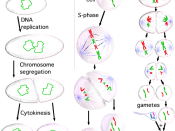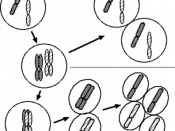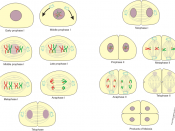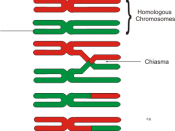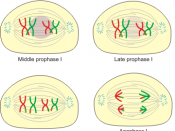Between meiosis and mitosis there are many unique similarities and differences such that mitosis has four stages and meiosis has eight. Or a similarity where they both have no new gene combination when each of the cells splits after each of their processes. Many more of these similarities and differences will be explained throughout the text.
Many similarities occur between meiosis and mitosis such that each process, after it has been gone through, result in no new gene combination. Each new cell also, after each process of mitosis or meiosis is gone through, has the same number of chromosomes. Each of the sister chromatids separate in anaphase in mitosis and anaphase two in meiosis since there are two major sets of phases in meiosis. This makes anaphase in mitosis very similar to anaphase two in meiosis. Meiosis two in meiosis is also very similar to mitosis. Also, when these processes have finally ended, they will form no homologous chromosomes in any of the new cells that have been formed.
On the other hand, there are many contrasts such that there is only one cell division in mitosis as there is two cell divisions in meiosis. These phases are called meiosis one and meiosis two. Another contrast is that mitosis produces only two daughter cells whereas meiosis produces four haploid daughter cells. These daughter cells come out exactly the same in mitosis but not in meiosis because the chromosomes exchange DNA strips with one another and four daughter cells are produced to mix the DNA. Typically, mitosis is a form of reproduction in prokaryotic organisms because they only have one cell whereas meiosis is a form of reproduction in eukaryotic organisms because they have many cells. In other words, mitosis is a form of asexual reproduction where one cell splits and forms two new cells and meiosis is a form of sexual reproduction that requires the union of a sperm and egg for this process to occur.
In conclusion, mitosis and meiosis have many comparisons and contrasts such that mitosis is a reproduction in prokaryotic organisms and meiosis is a form of reproduction in eukaryotic organisms. Mitosis and meiosis both do not form any new gene combinations making no two cells alike in any way possible. These are some of the most important similarities and differences between mitosis and meiosis although there are many more less important ones. There may be in the future the findings of more comparisons and contrasts between mitosis and meiosis but for now we may settle at these similarities and differences until later on.
